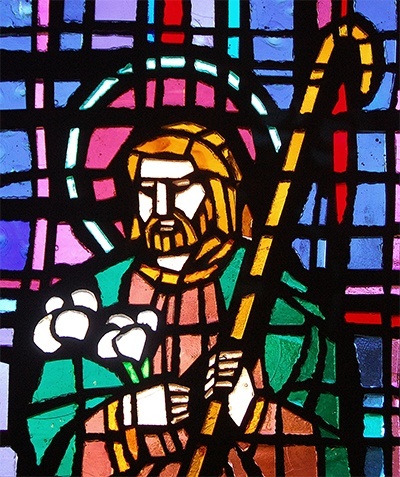By Florida Catholic staff - Florida Catholic

Photographer: JIM DAVIS | FC
Image of St. Joseph on a stained glass window at Assumption Church in Lauderdale-by-the-Sea.
The decree, Paternas vices (Fatherly care), was issued May 1 by the Congregation for Divine Worship and the Discipline of the Sacraments and promulgated by the authority of Pope Francis. St. Joseph has been included in the first Eucharistic Prayer since Pope John XXIII inserted his name in 1962. The new decree extends the inclusion of St. Joseph to Eucharistic Prayers II, III and IV.
The congregation explained that �in response to petitions received from places throughout the world,� Pope Emeritus Benedict XVI deemed the addition of St. Joseph to all the Eucharistic prayers �worthy of implementation and graciously approved them.� That approval has now been confirmed by Pope Francis.
Msgr. Tom�s Mar�n, pastor of St. Timothy Church in Miami and a canon lawyer, said that �in Eucharistic prayers 2, 3 and 4 you say �and the apostles.� The only saint mentioned by name is Mary. In Eucharistic Prayer 1, you name Mary, all the apostles and a whole list of saints.�
Blessed John XXIII inserted St. Joseph into that list of saints. But only the pope can change the Roman Missal so a formal decree was needed to add St. Joseph to the other Eucharistic prayers. This is the first such liturgical decree of Pope Francis' pontificate.
�This is a custom that was asked for at the (Second Vatican) Council and now is being responded to in full for all of the canons,� Msgr. Mar�n said.
St. Joseph is widely venerated in the Catholic Church. In 1870, Pope Pius IX proclaimed him Patron of the Universal Church, a feast celebrated on March 19. The Vatican�s decree says that St. Joseph �stands as an exemplary model of the kindness and humility that the Christian faith raises to a great destiny, and demonstrates the ordinary and simple virtues necessary for men to be good and genuine followers of Christ.�
The prayers will now read as follows:
Eucharistic Prayer II:
"...Have mercy on us all, we pray,
that with the Blessed Virgin Mary, Mother of God,
with blessed Joseph, her Spouse,
with the blessed Apostles,
and all the Saints who have pleased you throughout the ages,
we may merit to be coheirs to eternal life,
and may praise and glorify you
through your Son, Jesus Christ..."
Eucharistic Prayer III:
"...May he make of us
an eternal offering to you,
so that we may obtain an inheritance with your elect,
especially with the most Blessed Virgin Mary, Mother of God,
with blessed Joseph, her Spouse,
with your blessed Apostles and glorious Martyrs
(with Saint N.: the Saint of the day or Patron Saint)
and with all the Saints,
on whose constant intercession in your presence
we rely for unfailing help..."
Eucharistic Prayer IV:
"...To all of us, your children,
grant, O merciful Father,
that we may enter into a heavenly inheritance
with the Blessed Virgin Mary, Mother of God,
with blessed Joseph, her Spouse,
and with your Apostles and Saints in your kingdom.
There, with the whole of creation,
freed from the corruption of sin and death,
may we glorify you through Christ our Lord,
through whom you bestow on the world all that is good..."
This story was supplemented with material issued by the U.S. Conference of Catholic Bishops� Office of Communications.

